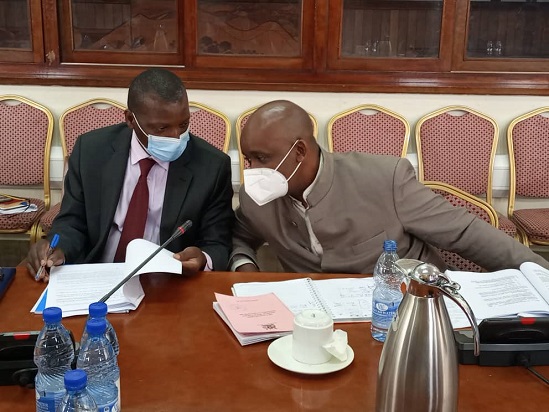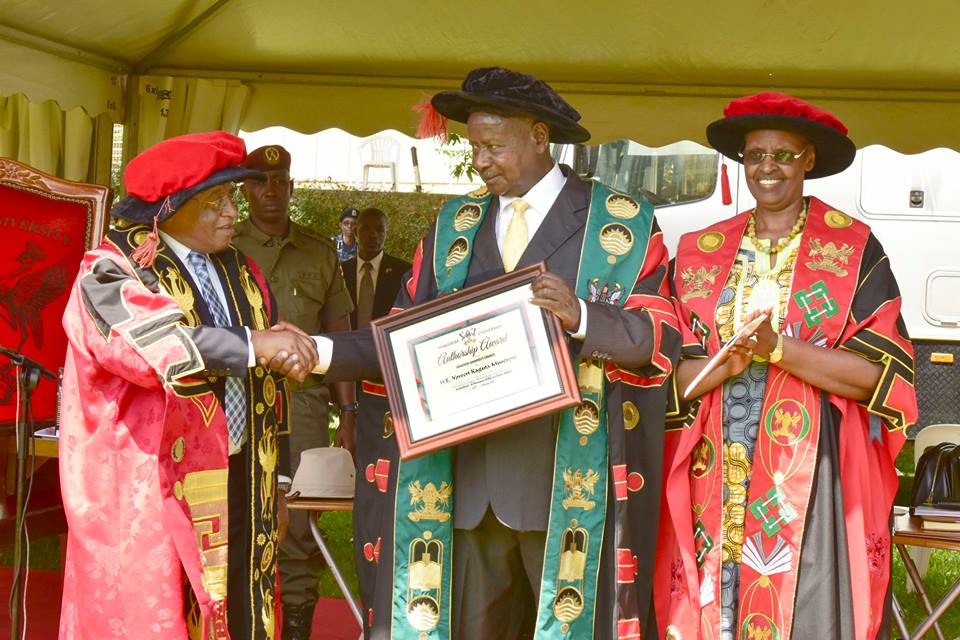Julius Mukunda Executive Director CSBAG (L) and Onesmus Mugenyi -Deputy Executive Director Advocates Coalition for Development and Environment (ACODE) appearing before Parliament Environment and Natural Resources Committee .
Government has been warned against giving Uganda National Oil Company powers to spent oil revenue at source on grounds that the oil money might be mismanaged.
The warning has been sounded by activists led by Julius Mukunda, Executive Director, Civil Society Budget Advocacy Group (CSBAG) during the 2022/2023 budget sensitization workshop held in Kampala.
He urged Ministry of Finance to ensure safeguards in the law to protect oil resources.
“I know we are all excited about oil, agreements were signed, new laws are now in Parliament but we need not to let down our guards on ensuring that the strong laws we put in our Public Finance Management Act to stop individuals and agencies to steal and misappropriate the money still remain,” Mukunda said.
In September, Minister of State for Planning, Amos Lugoloobi tabled before Parliament the Public Finance Management Amendment Bill 2021, that seeks Parliament approval to allow the Uganda National Oil Company (UNOC) to retain a portion of the proceeds from the sale of petroleum product so as to pay off services of contractors.
In defending the legislation, Government argued that Section 56 of the Public Finance Management Act 2015 establishes the Petroleum Fund into which all petroleum revenue which accrue to Government must be paid and this includes money from sale of petroleum funds and these have to be deposited into the Petroleum Fund.
The Ministry of Finance argues that the Act doesn’t provide for a mechanism by which the obligations of UNOC as a licensee under the Production Sharing Agreement and the Joint Operating Agreement are met in a manner consistent with the key contractual provisions, including cost recovery, under the Production Sharing Agreements.
However, Mukunda described these provisions as dangerous stating that any law that wants to provide a blank check to a company or government to spend money and return the balance later, isn’t in the best interest of Ugandans.
“The kind of laws we are seeing, coming in Parliament are actually threatening the existence of the Public Finance Management Act safeguards. The proposal not only removes powers of appropriation, but it also removes even the little resources that the resources we have secured and are likely to be spent by these agencies,” said Mukunda.
He added, “We understand the operations of UNOC are unique and commercial based, but we must ensure that there is a very strong oversight on how oil money is moved. We don’t know if these laws were crafted from Ministry of Finance, Ministry of Energy or State House, but we think the way they are, they aren’t going to help us to secure the little resources that we have.”
However, Kiryowa Kiwanuka, Attorney General while speaking to journalists at Parliament on Friday said that the amendment is to allow UNOC to meet its contractual obligation under the Inter-Governmental Agreement, Host Government Agreement and the Transport and Tariff Agreement.
The Attorney General said ‘Oil in kind’ is a method that is used world over, it isn’t new to Uganda because as nations produce oil at the wellhead, the number of barrels that come out of there are computed daily and if you want to transfer that crude to the pipeline you pay.
“If you say you don’t want to pay at the wellhead, then that means Uganda must have the cash at the well head to pay. If you don’t pay at wellhead, you lose value because they will take it, your oil will accumulate debt. The debt starts accumulating interest, charges. This method is used world over by owners of crude to pay in kind,” said Kiryowa.
The Attorney General also refuted claims that the proposed legislation is giving sweeping powers to UNOC saying that UNOC is 100% owned by Government of Uganda by 100%, UNOC is 100% controlled by oversight of Parliament and UNOC is 100% managed by Government, so the argument can’t arise.
“If you say aren’t we giving too much power to UNOC, are you not saying are we not giving too much power to Government to manage the oil for you. The option is, we could find someone to manage it for us but UNOC and Government are two faces of the same coil,” said Kiryowa.
Parliament’s Natural Resources and Environment Committee is scrutunising the Public Financa Management Amendment Bill 2021 alongside two other oil related bills include Income Tax Amendment Bill and East African Crude Oil Pipeline Special Provisions Act.
In an unprecedented move, the meeting is holding its meetings at Speke Resort Munyonyi instead of Parliament and the Committee report is expected soon.





